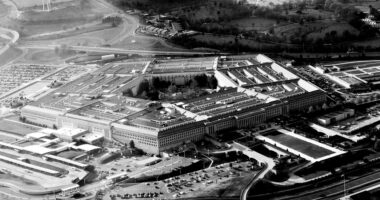SPACEX is today set to launch its third crewed mission, recycling a rocket and spacecraft for the first time.
A team of four astronauts will be propelled into orbit at 5:49am ET (10:49 BST) from Nasa’s Kennedy Space Center in Cape Canaveral, Florida.
The company’s Crew Dragon capsule, the Endeavour, will liftoff atop a SpaceX Falcon 9 rocket. Both have been used on previous spaceflights.
The nearly 24-hour ride to the space station, which orbits some 250 miles (400 km) above Earth, had been set to begin on Thursday.
However, the flight was delayed for a day by unfavourable weather forecasts along the rocket’s flight path.
For the rescheduled launch window on Friday, meteorologists predicted a 90 per cent chance of favourable weather at the launch site.
The mission marks the second “operational” space station team to be launched by Nasa aboard a Dragon Crew capsule since the United States resumed flying astronauts into space from US soil last year.
Astronauts had flown to orbit onboard Russian rockets during a nine-year hiatus at the end of the US space shuttle program in 2011.
It is also the third crewed flight launched to orbit under Nasa’s fledgling public-private partnership with SpaceX, the rocket company founded and owned by billionaire high-tech entrepreneur Elon Musk.
The first was an out-and-back test mission carrying just two astronauts into orbit last May.
Friday’s Crew 2 team includes two Nasa astronauts – mission commander Shane Kimbrough, 53, and pilot Megan McArthur, 49.
They’re joined by Japanese astronaut Akihiko Hoshide, 52, and Frenchman and European Space Agency engineer Thomas Pesquet, 43.
The helmeted astronauts, dressed in their custom white flight suits and black boots, walked out of the space center’s operations building a little over three hours prior to launch time.
Video showed them waving to onlookers and bidding goodbye to loved ones.
What is SpaceX?
Here’s what you need to know…
SpaceX is a cash-flushed rocket company that wants to take man to Mars.
It was set up by eccentric billionaire Elon Musk in 2002 and is based in Hawthorne, California.
SpaceX’s first aim was to build rockets that can autonomously land back on Earth for refurbishment and re-use.
The technology makes launching and operating space flights more efficient, and therefore cheaper.
SpaceX currently uses its reusable Falcon 9 and Falcon Heavy rockets to fly cargo to the International Space Station (ISS) for Nasa.
It also carries satellites and other space tech into orbit for various government agencies and multinational companies.
The company took astronauts to the ISS for the first time in 2020.
Other future missions involve carrying tourists to the ISS and astronauts to the Moon and Mars.
Musk has repeatedly said he believes humanity must colonise Mars to save itself from extinction.
He plans to get a SpaceX rocket to the Red Planet by 2027.
A caravan of SUVs from Musk’s electric car manufacturer Tesla then drove them to Launch Complex 39A.
The rocket pad was built during the 1960s and is famed as the launch site for the Apollo 11 flight to the moon.
“There’s nothing like it when you look out the window and see a spaceship getting prepared and realize that you’re going to be riding on it in a few days,” McArthur told reporters last week.
The crew is expected to spend about six months aboard the orbiting research platform conducting science experiments and maintenance before returning to Earth.
The four members of Crew 1, sent to the space station in November, are slated to fly home on April 28.
The Crew 2 mission also is special in that its Falcon 9 launch vehicle will fly using the same first-stage booster that lofted Crew 1 into orbit.
It marks the first time a flight-proven booster will be re-used in a crewed launch.
Reusable booster vehicles, designed to fly themselves back to Earth and land safely once they separate from the rest of the rocket minutes after launch, are at the heart of a SpaceX’s re-usable rocket strategy.
What is the ISS?
Here’s what you need to know about the International Space Station…
- The International Space Station, often abbreviated to ISS, is a large space craft that orbits Earth and houses astronauts who go up there to complete scientific missions
- Many countries worked together to build it and they work together to use it
- It is made up of many pieces, which astronauts had to send up individually on rockets and put together from 1998 to 2000
- Ever since the year 2000, people have lived on the ISS
- Nasa uses the station to learn about living and working in space
- It is approximately 250 miles above Earth and orbits around the planet just like a satellite
- Living inside the ISS is said to be like living inside a big house with five bedrooms, two bathrooms, a gym, lots of science labs and a big bay window for viewing Earth
The company helped pioneer the technique to make spaceflight cheaper.
SpaceX has to date logged more than 45 successful Falcon 9 booster return landings.
The company has refurbished and re-used most of them, some for multiple flights. But all of those flights, until Friday’s mission, carried cargo only.
Crew 2’s pilot, McArthur, will make a bit of history herself as the first female pilot of the Crew Dragon and the second person from her family to ride aboard the SpaceX capsule.
She is married to Nasa astronaut Bob Behnken, who flew the SpaceX demonstration flight with fellow astronaut Doug Hurley last year.
The same Crew Dragon was used for that flight as well.
If all goes well, McArthur and her three crewmates will be welcomed aboard the space station Saturday by the four Crew 1 astronauts.
They comprise three from Nasa and one from the Japan Aerospace Exploration Agency JAXA.
Two Russian cosmonauts and a US astronaut who shared a Soyuz flight to the space station also are aboard.
Science facts
Want to know more about the weird and wonderful world of science? From space and astronomy to the human body, we have you covered…
In other news, Nasa this week completed the first controlled flight on another planet following the lift-off of its Mars helicopter-drone, Ingenuity.
Musk wants to send humans to Mars as early as 2024 aboard one of the huge rockets.
And, Nasa set a hillside on fire during a recent test of the “most powerful rocket ever built”.
Are you excited for today’s launch? Let us know in the comments!
We pay for your stories! Do you have a story for The Sun Online Tech & Science team? Email us at [email protected]
This post first appeared on Thesun.co.uk

























